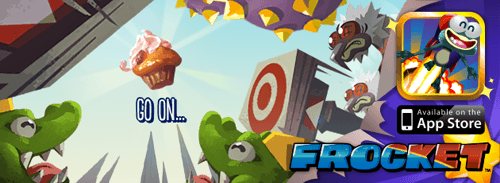Introducing Frocket

Last month I released my first mobile game Frocket. It's an arcade style action/puzzle game where the player launches through levels using barrels to find delicious cupcakes. The full version was launched as a $0.99 game on iOS for iPhone and iPad. A couple weeks later we released a lite version for free with less content, no Game Center, and no Score Attack mode. Immediately following the release of the lite version, we released the full version on Kongregate for free as a way to promote the full version on iOS. I'm currently working on an Android version and later potentially versions for the Mac App Store and Chrome store.
I was the sole programmer on the project, which was excellent for learning. The game was created using the Unity game engine, which when combined with certain Unity plugins allowed me to entirely bypass needing to learn Objective-C or much of how Xcode works. If you've ever considered making an iOS game but you were deterred because you don't know Objective-C, I highly recommend the Unity approach. Developing the game for different platforms was also very simple thanks to Unity. The web port took about a day just to ensure no iOS code was running and to implement ads promoting the iOS version. The Android version has taken a little longer so I could make sure we support a wider range of screen resolutions. All-in-all though it's been a fairly straightforward process. And now that it's done I'm very confident I could do it all again much faster. Here's a list of plugins used on the project and what they did for the game:
- iOS Etcetera Plugin by Prime[31] Request to rate app, Push notifications
- iOS StoreKit Plugin by Prime[31] Simple in-app purchases
- Megafiers by Chris West Allowed us to easily animate water and foliage
- Lumos by Rebel Hippo Used for analytics tracking/reporting
- Apsalar by Apsalar Inc. Used for analytics tracking/reporting
It took about 3 months to create the game with a team that was usually 5 people during development. It's the first "indie" game development approach by Ganz, and it really worked out well. We were able to create a lot in a very short amount of time, and we think it looks terrific and plays quite well. The first month was spent creating a prototype, character and environment concepts, and the game framework. The second month was spent creating art assets, levels, UI, and integrating the plugins mentioned above. The last month was spent on levels, audio, performance optimizations, testing, polish, creating the website, and some ads for marketing. The game took about a week to be approved by Apple. Now we're working on additional content, bug fixing, and ports.
The core learnings I've taken from this project are how to develop for iOS (Xcode) and Android (Android Developer Tools), mobile optimization techniques and constraints (lighting, audio, code, art, dynamic/static batching, etc), and of course marketing. Being the guinea pig game for our new mobile effort at Ganz, we've been able to experiment with basically whatever means we want just to see how it affects sales. All I'm going to say is there's a reason you can find so many articles online about the mysteries of being successful on the app store. There are a ton of tools available out there, but here's what I believe your ultimate goal should be. It sounds obvious, but you want as many good ratings as possible. Every marketing effort you do should be to push that number up. Doing so will greatly increase your visibility on countless charts within and outside the App Store. As a developer this means your logic in when you should prompt the player to rate your game needs to be absolutely solid. Really think it through for every release on every platform.
And lastly I'll leave with a couple tips to get download spikes. As I just mentioned above, many high ratings are what will get you on charts. But there are also a ton of sites our there tracking new games, includes updates. When your game first releases, if you're a fairly unknown developer or publisher, don't expect anything too exciting to happen. After some basic marketing and getting your friends to buy/download the game, if you did your rating logic properly then hopefully you'll get a decent amount (10+) before you are ready for an update. This is when it will get more exciting. Releasing an update will make your game appear on many, many sites but this time people will see the ratings and start paying attention to it. At least this is what I gather from my experience so far. Another tip you can try after getting some ratings is to make your game free for a day or two. Again, it will appear on sites tracking games that have dropped in price and with a decent amount of good ratings, people will take interest.
The post-launch experience of a mobile game has been just as exciting as creating it, and I look forward to the knowledge I'll gain while Frocket runs its course. Enjoy!